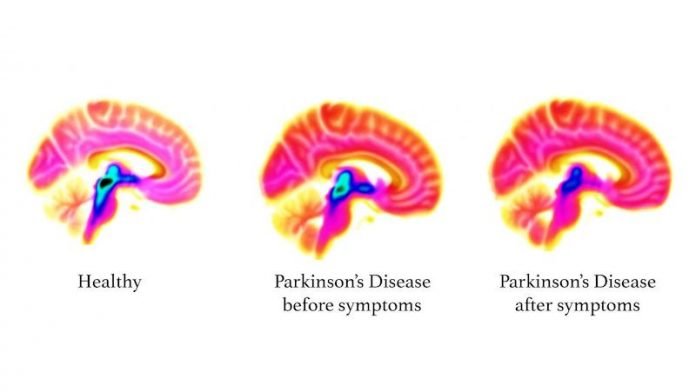
In a new study, researchers have discovered the earliest signs of Parkinson’s disease in the brain, many years before patients show any symptoms.
The finding challenges the traditional view of the disease, and it may lead to screening tools for identifying people at greatest risk.
The research was conducted by a team from King’s College London.
Parkinson’s disease is the second most common neurodegenerative disorder, after Alzheimer’s disease.
Patients with the disease experience movement and cognitive problems.
It is known to become established in the brain a long time before patients are diagnosed.
But it is very hard to examine the crucial early stages of the disease when treatment could potentially slow its progress.
Previous research has shown that people with Parkinson’s disease have build-ups of the protein α-synuclein in the brain.
While there is no clear cause for most people, a minority of cases are caused by genetic mutations.
People with mutations in the α-synuclein (SNCA) gene are extremely rare but are almost certain to develop Parkinson’s disease during their lifetime.
In the new study, the team identified 14 people with the SNCA gene mutation from Greece and Italy and flew them to London for brain imaging and clinical assessments.
Half of the participants had not begun to show any symptoms of Parkinson’s.
Data from the 14 people with SNCA gene mutations were compared with 65 patients with non-genetic Parkinson’s disease and 25 healthy volunteers.
The researchers found that the serotonin system starts to malfunction in people with Parkinson’s before symptoms affecting movement occur, and before the first changes in the dopamine system.
They found brain imaging of the serotonin system could become a valuable tool to detect individuals at risk for Parkinson’s disease, monitor the disease progression and help with the development of new treatments.
The study provides the first evidence of a central role for the brain chemical serotonin in the very earliest stages of Parkinson’s.
The team suggests that changes to the serotonin system may act as a key early warning signal for the disease.
The leader of the study is Professor Marios Politis, Lily Safra Professor of Neurology & Neuroimaging at the Institute of Psychiatry, Psychology & Neuroscience (IoPPN).
The study is published in The Lancet Neurology.
Copyright © 2019 Knowridge Science Report. All rights reserved.



